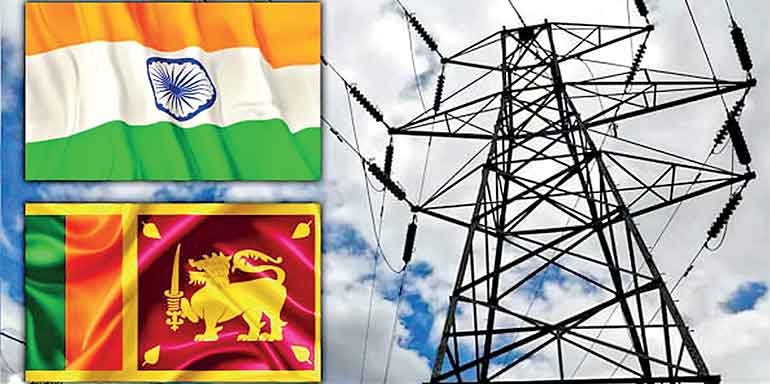Sunday Feb 22, 2026
Sunday Feb 22, 2026
Tuesday, 6 May 2025 01:28 - - {{hitsCtrl.values.hits}}

By interlinking our grid, we would be allowing another country to gain significant control over a fundamental aspect of our national infrastructure
 In the midst of Sri Lanka’s prolonged economic crisis, the proposal to connect our national electricity grid to India through an undersea transmission line has resurfaced as a seemingly pragmatic solution. Advocates tout benefits such as cheaper electricity, enhanced regional cooperation, and improved grid stability. But behind this optimistic facade lies a serious threat to Sri Lanka’s sovereignty, energy security, and long-term economic independence.
In the midst of Sri Lanka’s prolonged economic crisis, the proposal to connect our national electricity grid to India through an undersea transmission line has resurfaced as a seemingly pragmatic solution. Advocates tout benefits such as cheaper electricity, enhanced regional cooperation, and improved grid stability. But behind this optimistic facade lies a serious threat to Sri Lanka’s sovereignty, energy security, and long-term economic independence.
While maintaining harmony with our large and influential neighbour India is important, the Government of Sri Lanka has a solemn duty to protect national sovereignty, ensure energy autonomy, and uphold the integrity of our strategic infrastructure.
The permanent price trap
India, with its massive generation capacity, enjoys significantly lower electricity production costs due to its scale, resource diversity, and mature infrastructure. Whether it’s coal, solar, wind, hydro, or green hydrogen, India’s ability to generate power cheaply will far surpass Sri Lanka’s for the foreseeable future.
If a direct grid connection is established, Sri Lanka will inevitably lean on Indian electricity—not as a choice, but as an economic necessity. This will make locally generated power, including renewables, less competitive unless heavily subsidised. The result? A steady decline in investment and interest in building or maintaining domestic power plants.
Sri Lanka’s own Long-Term Generation Expansion Planning Studies 2023-2042, published by the Ceylon Electricity Board (CEB), estimates that even by 2042, our national electricity peak demand will remain below 10 GW. This is a manageable target with the right local investments—particularly given that over 62% of our current power mix already comes from hydropower, a clean and renewable source we’ve successfully relied on for generations.
Collapse of local capacity
Faced with financial constraints and the temptation of cheap imports, the Government may find it politically convenient to abandon or defer essential infrastructure upgrades and renewable projects. Over time, power plants may be decommissioned, skilled technical staff could migrate, and our institutional capacity to manage independent generation may erode.
As our local power sector weakens, India will shift from being a supplementary source to the primary supplier of electricity. We won’t just be importing kilowatts—we’ll be outsourcing control over a vital lifeline of our economy.
Geopolitical leverage: A dangerous precedent
Energy security is inseparable from national security. In October 2024, Adani Power Jharkhand Ltd., a subsidiary of India’s Adani Group, halved power supply to Bangladesh from the Godda coal-fired plant due to unpaid bills. This decision, despite formal notifications, led to a massive shortfall of 1,600 MW and exacerbated blackouts across Bangladesh.
This serves as a stark warning: cross-border electricity can become a powerful tool of pressure and control.
If Sri Lanka becomes similarly reliant, the power to disrupt our economy will no longer rest solely with us. At a time of diplomatic tension or policy disagreement, a switch in New Delhi could dim lights in Colombo. Sovereignty in such a scenario becomes conditional.
Sri Lanka has long prided itself on its non-aligned foreign policy, maintaining friendly relations with all nations while refusing to be drawn into the geopolitical rivalries that shape South Asia. The decision to interlink our electricity grid with India would undermine this delicate balance, putting us in a position where our energy supply is tied to one nation’s interests
Foreign policy and non-alignment: A major setback
Sri Lanka has long prided itself on its non-aligned foreign policy, maintaining friendly relations with all nations while refusing to be drawn into the geopolitical rivalries that shape South Asia. The decision to interlink our electricity grid with India would undermine this delicate balance, putting us in a position where our energy supply is tied to one nation’s interests.
This move could also complicate Sri Lanka’s relationships with other countries, especially in the context of international diplomacy. As a non-aligned nation, Sri Lanka has the flexibility to engage with a wide range of global players. A dependency on India for a critical resource like electricity would compromise our ability to maintain that independence. It would set a dangerous precedent, essentially aligning our future with one country’s political and economic whims, even at the risk of sidelining other important international partnerships.
The geographic reality: Beyond historical influence
Sri Lanka’s strategic geographic location has long made it a focal point for regional and global powers. Over the years, we have been repeatedly influenced by our powerful neighbour, India, in various matters of diplomacy, security, and economic policy. While maintaining cordial relations with India is important, connecting our electricity grid with theirs goes far beyond any of the past instances of influence.
The stakes are much higher this time. By interlinking our grid, we would be allowing another country to gain significant control over a fundamental aspect of our national infrastructure. Unlike previous political agreements, this decision could be irreversible, marking a significant shift in Sri Lanka’s energy sovereignty and possibly compromising our independence in ways we have not yet fully understood.
Technical, cyber, and systemic risks
Integrating two national grids is not a plug-and-play solution. It requires real-time coordination, frequency synchronisation, and protection systems that are vulnerable to systemic shocks. A failure in one grid could cascade across the other, creating widespread blackouts or technical damage.
Furthermore, cross-border grids increase exposure to cyberattacks. Without strong, autonomous cybersecurity infrastructure, any breach in India’s control systems could compromise Sri Lanka’s grid as well—jeopardising both stability and national defence systems.
Undermining Sri Lanka’s renewable future
Sri Lanka possesses enormous potential in solar, wind, biomass, and small hydro. These resources, if harnessed systematically, can drive decentralised energy solutions that empower rural communities, create jobs, and align with global climate goals.
However, an over-reliance on cheap Indian imports could undermine this green vision. It may discourage investment in domestic renewables and storage systems, delay the transition to energy autonomy, and divert focus from building national capabilities.
A strategic path forward
No country should mortgage its sovereignty for short-term cost relief. While cross-border electricity cooperation is not inherently negative, it must be carefully balanced, strategic, and conditional.
If Sri Lanka still wishes to explore interconnection, it must insist on:
A legally enforceable energy sovereignty clause protecting domestic generation priorities
Transparent and equitable pricing frameworks with independent dispute resolution
A strict cap on maximum import dependency to avoid systemic reliance
A parallel investment plan to upgrade and expand renewable and storage infrastructure locally
Any agreement lacking these provisions risks pushing Sri Lanka into long-term energy colonisation.
Conclusion: Power and principle
In geopolitics, control over infrastructure is power. Electricity is no longer just a utility—it is the backbone of every sector: industry, healthcare, finance, and defence. Sri Lanka must not cede control of this backbone to any foreign entity, however friendly or cooperative they may appear today.
The cost of losing control over our energy future is not just measured in rupees—but in lost autonomy, lost opportunity, and lost dignity. At a time when resilience and sovereignty should guide national planning, importing electricity must remain a last resort, not a foundational strategy.
Let us maintain friendship with India—but never at the expense of our independence.
(Author’s note: The views expressed in this article are the author’s own and do not necessarily reflect the editorial position of the Daily FT.)